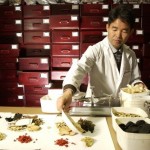Treating Infertility With Acupuncture And Traditional Chinese Medicine
 The inability to conceive has given rise to numerous treatment plans. Traditional Western medicine advocates the use of in-vitro fertilization, artificial insemination and also donor-egg transfer for hopeful couples. The process is long, expensive, painful and oftentimes disappointing. Treating infertility with acupuncture and traditional Chinese medicine is a new movement that augments the sterile, clinical environment and the costly – as well as invasive and uncomfortable – methods.
The inability to conceive has given rise to numerous treatment plans. Traditional Western medicine advocates the use of in-vitro fertilization, artificial insemination and also donor-egg transfer for hopeful couples. The process is long, expensive, painful and oftentimes disappointing. Treating infertility with acupuncture and traditional Chinese medicine is a new movement that augments the sterile, clinical environment and the costly – as well as invasive and uncomfortable – methods.
The use of acupuncture in conjunction with Chinese medicine is an already well-known – and very well-respected – practice for insomnia, chronic pain and stress relief. Extending the lessons learned and the applicability of the treatment for now also treating infertility with acupuncture and traditional Chinese medicine is a logical next step. It involves the insertion of medically sterile, small needles into the body’s meridians that are most commonly associated with bodily functions most likely connected to fertility, increased blood flow and hormone release.
It is noteworthy that it is the one-two punch of acupuncture and the traditional aspects of Chinese medicine — which is completely safe to soon-to-be expecting moms – that makes all the difference. Herbal medicine in particular is a quite powerful ally to the acupuncturist who treats a hopeful mother. Combining the stimulation of the right meridians with herbal teas and ointments leads to an increase in blood flow within the womb.
As a result, ovarian, follicular and endometrial functions improve and heighten the odds of successful fertilization and subsequent attachment of the pregnancy within the womb. This also holds true when combining Western and Chinese medicine in this process. Within this kind of setting, couples may consider treating infertility with acupuncture and traditional Chinese medicine while concurrently undergoing other treatments, such as artificial insemination or embryo transfer.
A combination of Western and Chinese medicine sets the backdrop for some of the strongest methodologies to fight the inability to conceive. Better yet, the combination of the two makes it possible to counteract the stress and physical downsides of Western infertility treatments. It is these noted and much discussed side effects that dissuade many couples from even trying to use medicine when hoping to overcome this struggle in the first place.
It is clear that prospective parents can greatly better their odds of conceiving a child by working with an acupuncturist who is trained in traditional Chinese medicine as well as Western medicine. A professional who is securely established in both disciplines has the medical understanding and practical know-how that guides him in the proper application of treatment modalities.
For example, it is a little known fact that treating infertility with acupuncture and traditional Chinese medicine can also assist in the avoidance of miscarriage. The first 12 weeks of a new pregnancy are the most dangerous to the fetus, and spontaneous miscarriage is common. Concurrently, it is also true that there are six points that the seasoned practitioner knows to avoid in the aftermath of an insemination or embryo transfer.
Only a highly trained, experienced acupuncturist has the expertise that makes it possible to continue on with treatment for the initial three months. It is obvious that treating infertility with acupuncture and traditional Chinese medicine during this time results in continually heightened blood-flow to the endometrium. Therefore, the mother-to-be increases the odds of maintaining and nourishing a healthy pregnancy.

